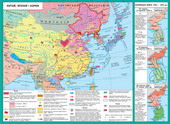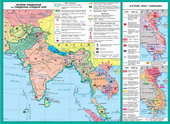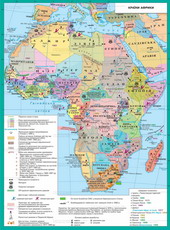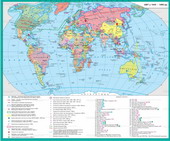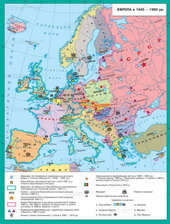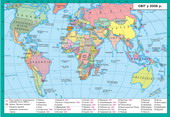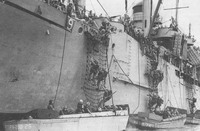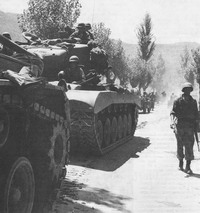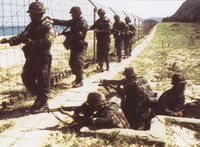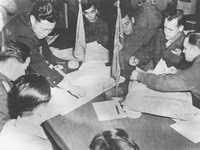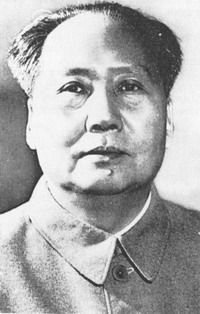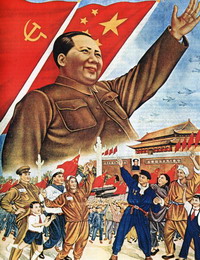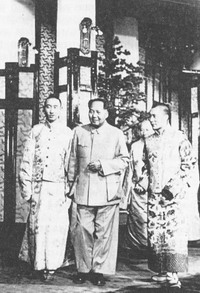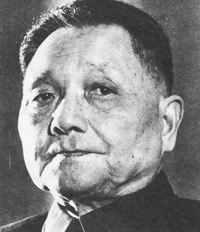§ 34.Turkey, Egypt, Syria, Lebanon, Iraq, in the second half of the XX -XXI century.
1. Turkey
The first post-war years in the politicalof Turkey were awarded viewing legacy of Atat Turkey was the development assistanceunder the Marshall Plan and its accession to NATO (1952). Turkey had to maintaina huge army (60% of the country's budget went to its content), the innerpolitics of anti-communism was rampant. Fighting communism ledthe restriction of constitutional rights and freedoms. Another thing in lifecountries was that the ruling was to use GP as a means of mobilize the population to their side Islam. Itwas another year away from Ataturk. Late 50's was markedserious public speeches against the government, for their suppression wasuse unconstitutional methods. After the event the military intervened.May 27, 1960 there was a military coup. Established military committeeNational Unity (KNYE) abolished the 1924 constitution, dissolvedparliament, banned political parties. Thus ended the existence andRepublic (1924-1960).
Army, completing a revolution, notgathered to take control of themselves. Their actions were motivated by the desirestop the political crisis and save the course of Turkey launchedAtaturk. Later the military more than once guarantors unchangeddevelopment of Turkey as a secular, national state.
KNYE instructed the country's leading lawyerssign a new constitution, adopted in a referendum in 1961Adoption of the Constitution was the beginning of the Second Republic (1961-1980).According to the constitution of Turkey was defined as "social and legal state."Fixed planned economic development, declared the need foragrarian reform and the possibility of nationalization of private property.The Constitution contained an article warning unconstitutional actions on the partpopulation and the government.
An important feature of the Second Republichas become a multi (12 games). After the restoration of civilian rulecountry has not received sustained development: inter-party squabbling gave of themselvesevident. Economic development in the 60's and 70's was quite stable: 4 timesthe number of enterprises, 7 times - manufacture significant role in the economyplayed by the public sector. Due to state and foreign investmentbuilt of heavy industry. Turkey tried to realizeovertaking development strategy by making extensive importzaminnuIndustrialization, which was established in the late 30's.
However, economic and political modelSecond Republic proved ineffective. Late 70's it has captured the deepcrisis. The public sector economy proved ineffective, corruption flourished.None of the political parties have enjoyed the general support of the population.After this event again intervened military. In September 1980 occurredmilitary coup. S. Demirel government was overthrown, dissolved parliament,suspended the activities of political parties and trade unions. Power in the country passed into the hands ofNational Security Council (NSC) formed by the military led by ChiefK. Evrenom General Staff.
The military government carried outwithin three years. In 1982 they have entered into effect a new constitution thatactually approved a course on "Democracy, which is directed and launched a newstage in development, called the Third Republic (1982 - presentday). The Constitution strengthened the executive authorities, the mediainformation passed under state control, limited trade union activity.Military, transferring power to civilian activities allowed only those politicalparties that are not successors
earlier. In the elections of 1983 won the Motherland Party onled by Turgut
Implementation of the program allowed
However, the rate of liberalization has not reachedultimate goal. Turkey has not reached the European standards. At the same time incountry nakopylas critical mass of problems. The most painful of which wasunemployment (5 million people.) inflation, the Kurdish problem. All these problemsexacerbated the lack of an effective social security system, significant socialstratification, low educational level of the population.
The negative implications of reforms led torising popularity of the opposition forces. In early elections in 1995defeated party, which was on the Islamic position - Welfare Party (RP)led by N. Erbakanom. Since coming to power antyzahidnyk slogans Erbakan beganstrengthen relations with Islamic states. He became the advocate for the creationin contrast to the Group of Seven "major Islamic Eight. In the middle of the country Erbakanbegins to "Islamization" of the economy (30% of the country controlled the industry"Islamic" capital). Quickly began to spread Islamic education (in1982 According to the Constitution zaprovadzhuvalosya teaching Islam in schools).
Turn in the policy failed to encourage economicrecovery. Inflation continued to rise (for 1995-1997 - has increased by80%) were not carried out promised reforms of the tax system, suspendedprivatization of public sector decreased amounts of foreigninvestment.
After President S. Demirelappealed to the military. They demanded an ultimatum to cease conductingIslam-minded course. Erbakan was forced to resign. Country againreturned to the path of social development. However, Islamists and nationalists ("GreyWolves ") retained considerable influence in society.
The most significant problem the lastTurkey for decades was the Kurdish problem. Since the establishment ofTurkish national state is not supposed to recognize the rights of nationalminorities. Kurds (6,5 million people.), As well as other minorities were subjected toforced assimilation (oturechennyu). In the Kurdish language was imposedProhibition and the Kurds are officially called "mountain Turks."
Since the late 60's emerged in Turkeyorganized by the Kurdish national movement. They began to appear on 'political parties.The most influential of which was the Kurdistan Workers' Party, founded in1979 Abdullah
In the postwar years in Turkeyforeign policy kept stable pro-Western position. Becoming a member NATOTurkey has become the forefront ofThe Cold War. To 1962 was located in its territory U.S.nuclear weapons. Turkish troops took part in the war in Korea. Butstrategic pro-Western line is prevented Turkey to support national liberationSuppression of Islamic countries in 40 and 60 years (Algeria, Yemen, etc.). In 1974between Turkey and Greece (both countries members of NATO) armed conflict broke outon the island of Cyprus. On the island of Turkish troops landed, which occupied part ofisland inhabited mainly by Turks. It was declared a Turkish republic. Inresult, Cyprus has been split into two countries. However the Turkish state, exceptTurkey, no one recognized. Now the island between the two communities (Greek andTurkish) are continuing talks on unification. Their result depends on whetherCyprus becomes an EU member.
The collapse of the Soviet Union gave a new impetusTurkish foreign policy. In the 90 years she has tried to implement the ideaAssociation under its auspices all Turkic peoples, countries (a"Great Turan" or "Greater Turkestan from the Mediterranean to the Great` IWall "). Turkey is to provide financial, military, economicassistance to Azerbaijan, Uzbekistan, Kyrgyzstan, etc..), to form a singleinformation space, strengthening cultural ties. But to implement suchgeneral terms the potential of Turkey is clearly not adequate.
2. Egypt
After World War II Egyptremained under the control of England, a country ruled by King Farouk. Economydeveloped unilateral (growing and processing cotton).
King promised reforms were notCommitted. In a society nazrivala crisis dominated the anti-English sentiment.The only organized force that could lead the revolution was the officer corpsEgyptian army. In 1938 Anwar Sadat created the organization "Freeofficers, which aim to put British expulsion from the country. DuringWorld War officers, focuses on Germany, but to establish contacts withRomelem (commander of the German African Corps) failed. In1942 German forces suffered defeat, Sadat was arrested and"Free Officers" led by Gamal Abdel Nasser.

Gamal AbdelNasser next General Ali Muhammad Naguib
duringtriumphal tour the streets of Cairo. July 1952
At some time in the initiativenational liberation movement has passed into the hands of Fatah, whichKing maintained. July 23, 1952 uprising began Cairogarrison. It was created by the Revolutionary Command, headed by General Naguib(The most authoritative person in the country). July 26, King Farouk signed a decreeresignation and left the country, but the monarchy remains formally the summer1953 when Egypt was proclaimed a republic. Nasser becamePrime Minister, and in 1956 was elected president. The new government quicklydeclared the agrarian reform (fall 1952) was installedmaximum tenure of 200 fedaniv (1 fedan = 0.47 ha.) But the reformimmediately went off. He also began to negotiate the transfer of Suez Egyptchannel, which was managed by Anglo-French company. But to no avail.
In 1955 Nasser takes part inthe Congress of countries that have not become (in Bandung), where herecommended to refer to the USSR for help, which he did. SovietUnion provided Egypt, military and economic assistance. Received powerful support andWishing to become a leader in the Arab world, in July of 1956 A. Nasser announcednationalization of the Suez Company, challenging England and France and themost rozburhavshy imagination Arabs. To further raise its credibility in the eyesArab world, he starts preparing for another war with Israel -zahalnoarabskym enemy. But Israel is ahead of him and starts to preventivewar, capturing the entire Sinai Peninsula. Nasser saved from shame thatin October 1956 Anglo-French forces attack Egypt and seizeSuez Canal area. In such conditions the side of Egypt became the USSR. After threatswhich use nuclear weapons against U.S. aggressors and requirements, to stop aggressioninterventionists troops were withdrawn from Egypt. Nasser unawares and defeatedturns into a winner just over three countries.
In 1956-1961 he passesthe second phase of reforms. The leading idea of this phase was the policy"Yehyptyzatsiyi - bet on yourself (in the national capital andresources). Before 1961 Egypt has been forced out of foreign capital. In1958 with the Soviet Union was a treaty of friendship andcooperation. It was extended and agrarian reform. Maximum tenurewas limited to 100 fedanamy. Other lands were confiscated and passed for priceVillagers 3-5 ha.
In 1958 association heldwith Syria in the United Arab Republic, in which the dominant position occupiedEgypt. Between 1961-1967 he was conducted the third phase of reforms under the sloganconstruction of Arab socialism. The main substance of which was the creation of the statesector. Were nationalized railroads, vehicles, constructioncompany. In 1967, public sector was 70%. In agricultureeconomy continued land reform. Maximum tenure wasfedanamy limited to 50, the villagers stopped paying ransom. It began holdingcooperation in agriculture.
Most economic aid Egyptprovided the USSR. It was built Heluanskyy Metallurgical Plant, Aswanhidroelektrokompleks, and nearly 150 objects. In the political sphere was going processa one-party system. In 1963, established ArabSocialist Union (ACC), which became the dominant force in society.
Economic transformation and closecooperation with the Soviet Union did not contribute to raising living standards.The public sector, which already amounted to 95%, proved ineffective. Growingbureaucracy absorbed all budget revenues. In addition, the country finds itself ininternational isolation. Also, the Soviet military sought to consolidatemilitary presence in the region. The plans of the General Staff of the USSR, the ideathe establishment in Port Said Navy base USSR. Egyptian leadership on this is notpohodzhuvalos. In response to Soviet arms shipment intercepted and grain assistance andEgyptian authorities also were given false information that Israelcarry out an attack on Egypt. "Friendly warning" of the Sovietleadership played a crucial role in moving the Arab-Israeliopposition to the stage of crisis. Immediately thereafter began large-scaleEgypt and Syria preparing for war. But it should be noted that the followingArabs largely provoked the Israelis themselves.
May 19, 1967 EgyptianPresident demanded the withdrawal of troops from the country of the UN, 23 May, he announcednaval blockade of Israel, which receives 80% by sea vitalproducts. These actions of Egypt and Syria were regarded by Israel as preparation forinvasion, and 5 June, Israeli troops launched a powerful preventiveimpact on the Arab troops, who suffered heavy losses. In the six daysWar Arab countries suffered a crushing defeat. by Israelvictory increased its territory at 68.5 thousand km2, CapturingSinai Peninsula, Gaza Strip, Golan Heights, West Bank RiverJordan, Jerusalem. Having grasped these territories, Israel is thus created arounda "security zone". In occupied territory, the Israelis are beginning tocreate village militias.
War of 1967 was the resultmisunderstanding between Arabs and Israel. Neither side wanted to givehis principles and stood for the showdown.
To save Egypt from the finaldefeat the Soviet Union sends troops to a country that stopped the offensiveIsraeli troops (Operation Kavkaz).
Defeat in war was politicalNasser's death, though he remained standing as the leader of the Arab world. He evenannounced his resignation, but "asking people" remainedpresident. September 28, 1970 Nasser dies. (In 1964, hewas awarded the title Hero of the Soviet Union).
Nasser as Successorbecame president Anwar Sadat, who did not share the socialist beliefs Nasser,the enemy was close alliance with Moscow and wanted to change the course of the country. Hebelieved that the key figure in the Middle East is U.S., not the USSR, and that onlythey could affect Israel. Moreover, Sadat could not accept that helong time was the second person in the country, while he was actuallyorganizer of the "Free Officers". His desire to beat aroundNasser, as well as the need for change in Egyptian society that has ended up indeep crisis, and became the driving force of his transformation. Sadat cameto power and began to pursue a policy known as "reverserate. "Of all the public positions fired by supporters of Nasser and the SovietUnion. The economy began the process of privatization and attracting foreigncapital. Sadat did not dare to go immediately to a complete break with the Soviet Union: heneeded a weapon that he could only get from the USSR to take revengewar with Israel. He demanded that the Soviet leadership, the latest models of arms.USSR agreed, but on condition that it can be used only with permission from Moscow.This Sadat disagreed. Finally, July 17, 1972 he askedSoviet military specialists from the requirement to return home.Soviet-Egypt friendship expired. Sadat refused the services of the Sovietmilitary advisers, not that he was ready to go closer to the U.S.. Hewanted to take revenge against Israel and he feared that the USSR would be thiscounter. (Soviet leaders arranged "cold", not "hot" war onEast). Sadat also did not refuse from a union with Moscow if the Soviet Union went ondirect confrontation with the U.S. for Egypt. Fortunately, Moscow has been careful inEastern politics.
October 6, 1973 dayJewish holiday Yom Kippur Egyptian troops swift kick forsuvalySuez Canal and entered the land of Sinai, which was lost in the war1967, and stopped the attack (the Soviet Union and Yugoslavia have providedmilitary assistance). The same day, Syrian troops have caused the attack on the Golanheight, but the attack failed. The first day was lost1200 tanks.
Recovering from a stroke,Israeli troops in the southern sector of the front and Suez launched forsuvalyattack on Cairo. Egyptian Sinai on the part found themselves surrounded.
October 22, 1973 Security CouncilUN adopts resolution on an immediate cessation of hostilities. In such conditionsEgypt and Israel came to a truce. Seven the October war was over. AsSadat later explained: "Against Egypt were united forces of Israel and the U.S.and stood behind the USSR and, smiling maliciously, was ready to strike inback. "Despite the poor finish, Egypt in this war gotmoral and psychological victory. It was proved that the Israeli army canwin.
Having credibility in the war Sadatbegins to actively pursue its policy of "reverse course". Heabandoned ambitious Pan-Arab aspirations. The country was calledArab Republic of Egypt (Egypt). Since 1974 liberalizationEconomics and Trade (infitah). In June 1975 openedSuez Canal, which never managed to make Nasser. This is the basisEgypt economic recovery. Been conducted and political reform: eliminated monopolyACC power. In 1976 Sadat was re-elected to the presidency.
Zakripyvshys power, Sadatbegins to seek a bilateral peace treaty with Israelafter failing to reach an agreement on settlement of the Middle Eastconflict during the Geneva Conference in 1973, which presentedall parties to the conflict through the mediation of U.S. and USSR. The first step in thispath was the establishment of close relations with the United States. Secretary of State HenryKissinger became the intermediary between Israel and Egypt. March 14, 1976Sadat denounced the Treaty of Friendship and Cooperation with the USSR. In September1977 held a secret meeting between Egypt and Israel,Two months later, Sadat arrived in Jerusalem (unrecognized world communitycapital of Israel), for which the Arabs fought 30 years. Speaking in the Israeliparliament (Knesset), he offered peace, which was signed March 261979 Washington (Camp David, the residence of U.S. presidents).
Refusal to fight for the destruction of EgyptState of Israel and the liberation Palestine wasgreeted with joy in Israel and the West, but with indignation was seen inArab world and the socialist camp, which viewed the move as a betrayal. InOctober 1981 during the parade group of soldiers with rifles and shotstoned grenades rostrum, where the Sadat.
After the assassination of President SadatEgypt was Hosni Mubarak, who continued the policy begun by Sadat.Deprivation of Egypt naserovskoho socialism, helped to make Egyptstable country with a normal economy. A soured relations with the Arabstates were eventually recovered. In Egypt 90 years went back toleading position in the Islamic world. Egypt also receives billions in aidthe United States.
In the 90 years Egypt hadface the problem of Islamic extremism. Attacks on foreign touriststerrorist groups almost undermined the tourism industry in the country with a richpast. However, tough government measures have helped curbextremist movement.
3. Lebanon
Formally Lebanon gained independencein 1943, but in fact it was made after the withdrawal of foreign troops fromcountries in 1946 Lebanon - the only country in the world where the whole state structurepower, bottom to top, and largely civil and political life are builton confessional basis. The population is divided between the four religious denominations:Christians - 37,4%, Shiites - 30,2%, Sunnis - 21,5%, friends - 10,9%. (PopulationLebanon's estimated 3 million people).
In the early 40's between the leadersmain confessions were made a "gentleman's agreement" distributionseats in parliament and important office. Of the 99 MPs in 1954 you- Christians 45 - Muslims. President- A Catholic Maronites, the prime minister - a Sunni Muslim, the Parliament -Orthodox (later Shiite).
In Lebanon, there are about 100 party-organizationscommunal and religious-political groups. In the majority of these groupsbuilt on clan sekstantskymy signs. 20 of them have the official namepolitical party.
To 1970 Lebanon wasprosperous country and save quite a creaky religious and political freedom. In1970 King Hussein (Jordan) Palestinians deported to their country.Most Palestinian refugees ended up in southern Lebanon (500 ths.)AFP leadership and is situated in West Beirut (Kayiry agreement between the leadersPalestinians and the Lebanese government). Palestinians in southern Lebanon created a statein the state.
Inflow to the country manyMuslims undermined existing unstable political system of Lebanon, split byreligious criteria. Muslims have an advantage over the Christians. EventuallyThis situation led to civil war between religious communities, clansetc. (1975). Palestinians easily dislodged weak Lebanese army from the southcountry.
In 1976 was introduced in LebanonSyrian troops to protect Christians. But then the Syrians began supportingMuslims. The presence of Syrian troops was approved by decision of the conferenceThe Arab leaders under the banner Mizharabskyh security number30 thousand people. Fuel to the fire of war and enmity between pidlyla 3-headed Christianclans.
Since the first outbreak of the CivilWar came out a winner Zhmayeliv clan, which has managed to unite under his authorityall Christians (Christian militias - "Lebanese forces"Falangist, Christian militia 15 thousand people.). But the country remainedsplit between Christians and Muslims. Beirut was divided into so-called"Green line" in eastern (Christian) and western(Muslim).
As president of Lebanon, BashirZhayel set the objective to expel foreigners from the country: the Palestinians andSyrians. For this he needs an ally. That ally was Israel, which supplied arms to Christians.
Israeli intervention in Lebanese affairsresulted in two large-scale operation: 1978 - OperationLitani and 1982 - "Peace of Galilee".
As a result of aggression 1978Despite the strong resistance groups and NPCs ABOUT Lebanon, Israeli troopsoccupied by 2 thousand km2. (17% of the country). Security Council to immediatelydemanded the withdrawal of Israeli troops and UN troops deployed to ensurewithdrawal aggressor.
In June 1978 Israelremoves its troops, but the occupied territories creates a puppet state"South Lebanon".
In April 1981 Christiansstart fighting against the Syrians in the Israeli air support that trade frictions and shockson Syrian positions. Cooperation with Israel, condemned the Christians evenUnited States, and under their pressure fall 1981 Maronites announced the break withIsrael, but preserved the secret contacts. In 1982 held secretZhmayelya meeting with Israeli Defense Minister A. Sharon, where agreement was reachedjoint actions against Palestinians. (Israel conducted a military operation againstPalestinian groups in Lebanon, who carried out the attack on Israeli territory).
The reason for the invasion was difficultwounded by Palestinian terrorists in Israeli ambassador in London. In June1982 Israel started to implement the Operation Peace of Galilee ". In thiswar, Israel used the new destructive weapons that have caused deathlarge number of civilians and destruction of towns and villages in Lebanon.
After long and fierce battlesIsraeli troops destroyed the military infrastructure of the Palestinians, and their remnantstroops were evacuated to Tunisia. August 23, 1982 Zhayel was electedpresident. Lebanon was preparing to establish diplomatic relations with Israel.The country landed American, French, British and Italian troopsfor peacekeeping missions. It seemed that the establishment of peace on the Lebaneseland.
But peace, established by force, notkeep and month. September 14, 1982 Zhayel killed by bombunderlays Islamic terrorists. In response, Christians had slaughteredin the Palestinian camps Sabra and Shatila. Hromadanska war opened a newforce. She has been involved American, French and Syrian troops. Afterexplosion barracks of American and French troops (about 300 people died.) themhad to leave Lebanon (February - March 1984).
Against Israeli troopsbegan a guerilla war. Place occupied Palestinian patriotic forcesLebanon and Shia groups. This forced Israel to withdraw its troops from Lebanon inFebruary - July 1985
Trying to establish peace in Lebanonexternal forces by force failed.
The country was divided between differentgrouping (prosyriyska organization Amal, proiranskaHezbollah, the various Christian factions). In southern LebanonIsrael has created a "security zone" (width 20 km) and a puppet governmentSouth Lebanon. In the Bekaa were Syrian army (40 thousand people.).
Despite these difficult conditionsLebanese found strength and managed to restore peace in the country. The politicalsettlement of Lebanese crisis began in autumn 1989 In Saudi Arabiain ET-Taif member Chamber of Deputies (parliament) approved the Lebanon"Charter of national consensus" - the radical measuresrestore peace. "Charter" established a more equitableproportion of Muslims and Christianspublic bodies. Towards implementation of the agreement the country has experienced severalmajor shocks: the murder of President Robert Muavvada; mutiny temporary chairmanmilitary government of General AWN M. (October 1990), which was suppressedLebanese and Syrian troops, fighting between the factions, "Amal" andHezbollah (January 1991).
In December1990 established "government of national reconciliation", in whichincludes leaders of all political forces. Government began to introduce order strong-willed actionsin the country, gradually spreading authorityall areas of Lebanon. Essential support in this process has provided Syria.
May 22, 1991 in Damascus wassigned the Treaty on brotherhood, cooperation and coordination. By contractbetween Syria and Lebanon were established "special relationship" ineconomy, politics and security. Syria has committed itself to defend Lebanonof aggression and help restore power in the country.
This Treaty was greetedmixed, both within the country and abroad. But openlyagainst him, no one dared.
Charter and the Treaty with Syria helpedreturn to peaceful life. But before many Lebanese still faces problems: notfinally solved the problem of Palestinian camps to rebuild whatdestroyed 15 years of war in the south continue to operateantyizrayilski group Hezbollah and others.
In 2000, Israel had withdrawn itstroops from the south. On the border between the two countries posted troops UN.Also, UN agencies, among them Ukrainian, carry out demining areacountry.
4. Syria
In 1943, Syria wasproclaimed an independent state. In 1946 of the country were broughtforeign troops. To power the country came representatives of the local elite:merchants and landowners. The requirements of the population of the agrarian reform, theyignored and suppressed by force. The failure to implement reform the existing regimecaused military strife. During the 1949-1954 biennium in power in Syria inOfficers were alternately different factions that no major changes in lifesociety have brought.
In 1954, thanks to the widepopular uprising, the country was restored constitutional order. Anti-Westernorientation of the Syrian regime led to a rapprochement with the Soviet Union.In 1955-1957 he concluded a series of economic deals and sales agreementSoviet weapons. In 1958, following the idea of Arab unity,Syria and Egypt united into one state - the United Arab Republic(UAR). In Syria was carried out nationalization of big industry and beganagrarian reform. But this association was not strong due to unequalRelations between Egypt and Syria. After the restoration of independence the situation inthe country was unstable. The new government began to turn the enterprise and landformer owners. This was a new state riot. In March1963 to power in Syria came a group of supporters of Ba'athist officers(Arab Socialist Baath Party), but they promised to transformcommitted.
Only after coming to power in1966 Hafez Asad (representative of the left wing of the Ba'ath) began activeof economic transformation: natural resources were declared state propertyfarmers receive land for price (symbolic), was nationalized largeindustry and established state control over banks. Thus, HafezAssad made his regime a social resistance. In 1972, the country wasestablished one-party system. Power is monopolized the National Progressivefront. After the death of Hafez al-Asad in 2000 was succeeded by the son -Bashar Assad. Who continued the policy of his father.
An important innovation of the youngthe president was focusing on economic development. Mainfocuses on the development of advanced information technologies. For three yearscountry saturation of mobile phones, Internet users andsatellite communications and television than in Ukraine (until 2000 allit was banned).
This focus on developmentcaused by the absence of significant natural resources.
Syria's rulers have always beenmajor opponents of Israel's existence. Syria participated in allArab-Israeli wars and most of them fail to myself. During the war1967 it lost the Golan Heights, which until now trying toreturn, both the military and diplomatic means. After Camp Davidagreement between Israel and Egypt, Syria remained almost alone with Israel, according towhich stand behind the U.S.. Due to high material costs, Syria couldestablish military-strategic parity with Israel, but further arms racecould lead to economic bankruptcy of the country. Since 1992 IsraelSyria and negotiations on the relations according to the formula "peace inexchange of captured territory.
A serious problem for Syria isrelations with Iraq. Since 1920 by 1957 Iraq is pursuing a policy ofthe gradual unification of the two countries (Syria absorption). The first attempt of King of IraqFaisal I, who was crowned in Domasku was unsuccessful, he was expelledwith Syria. After that Syria got into colonial dependence on France, Iraq- From England. King Faisal II plannedrebellion that was to give him complete power over Syria, but this plan does notzdiysnyvsya, Faisal II was overthrown in a coup in 1957 resultSince coming to power in Iraq, "Republicans" have never left the ideaSyria's accession and the creation of the Arab Empire from the Persian Gulf to the coastMediterranean Sea.
For a long time Syriamanaged to restrain the expansion of Iraq. The revolution in oil prices (from 1973 to1980 they have grown 4 times) and rising oil (Iraq takes 2place in the Middle East) have totally changed the situation. Iraq received almostunlimited financial resources. While Syria as the main effort directedagainst Israel, Iraq, infrastructure and investing MIC and throws his armyagainst Iran. Syria, fearing similar action against it, Iran is on its side, thethus was finally buried the idea of Arab unity. After the aggression against IraqKuwait Syrian troops took part in the liberation of the latter.
However, after the defeat of the regimeSaddam Hussein in 2003 Syria has strained relations with the U.S., which accusedSyria in supporting terrorism, developing chemical weapons, leaders ukryvanniprevious regime.
5. Iraq
In 1932, Iraq gainedindependence, but under an agreement with Britain remained in the countryBritish troops. This England carried out military, economic andpolitical control over the country. In 1942, Iraq isanti-English rebellion (with the assistance and participation of Germany and Italy), but ithas failed.
Before 1958 existed in the countrymonarchy and the existing government spent proanhliysku policy. In 1955 Iraqjoined the Baghdad Pact. The country's current political regime and the monarchyform of government do not enjoy popular support. November 141958 Baghdad is in the military mutiny, in which it wasoverthrown the monarchy. Iraq was proclaimed a republic.
After installing a newpolitical regime were carried out economic reforms, agriculturalreform. Iraq out of the Baghdad Pact and established economic ties withUSSR. But since late 1959, the Iraqi government is pursuing a policyto set off the economic changes. This party took advantage of BAAC (Baas -Arab Socialist Baath Party. Ideas and keep arabizmusocial justice: "Unity, Freedom and Socialism." Valid inIraq, Syria and other Arab countries) and by a coup inFebruary 1963 came to power, but stay in power failed. InNovember 1963 group of officers carried out a coup and established a militarydictatorship, but the situation in the country is stabilized.
November 17, 1968 Baas againcame to power. Revolutionary Command Council headed by General Ahmad HassanAl-Bakr. In 1969 the second person in the state and the party is Saddam Hussein.In the early years of the Baath pursuing a policy of consolidating power. In1970 adopted the law on agrarian reform (it was eliminatedlandlordism, anticipated the development of cooperatives in rural areas). In1972 was nationalized oil companies "Iraq petroliumCompany, and in 1973 the assets of the oil monopolies Holland and USA. The1975 completed the nationalization of oil and processingindustry. Thus was created the financial base of the existing regime.
In 1973 Iraq waseliminated a multi-system: all parties united in a singleProgressive National-Patriotic Front (PNPF). Since 1969 in the party andstate apparatus conducted periodic "cleansing" to eliminateopposition. In 1977-1978 he was between PNPF and the Iraqi Communist Party (ICP)conflict occurs, the ensuing persecution of Communists and the transitionICP on partisan forms of work and, consequently, the loss of support amongpopulation. These processes contributed to the establishment unilateral dictatorial regimein Iraq.
In 1972 the USSR and Iraqwas the agreement on friendship and cooperation. Soviet Union provided economic (built100 industrial facilities) and military assistance regardless of changes in managementIraq. Iraq became an associate member of the CEA.
In 1979, to power in the countrySaddam Hussein came. To strengthen his power and his authority to raise SaddamHussein launched a war against Iran, but planned as a short-term conflictit resulted in a bloody eight-year war. Other reasons wars areSaddam Hussein's feared Iraqi Shia uprising against the existing regimeinfluenced by the revolution in Iran, creating the Great Iraq by joiningsouthern areas inhabited mainly by Arabs of Iran (Khuzestan province).Gradually the war in Iraq propaganda was presented as a defense of Araboil exports to the Islamic revolution in Iran. In 1988 between Iran andIraq truce was signed `I in the Fall 1990 - Peace on terms of fullrestore the prewar status quo. This war has brought only destruction andthe loss (on both sides were killed about 1 million people). From Iraqrich countries become a debtor ($ 80 billion). To solveinternal difficulties, especially financial, Iraq dares to adventure againstKuwait's plan to seize wealth Kuwaiti sheiks. But the Iraqi resistanceaggression by the world community has become a barrier to the implementation of theseplans. The Iraqi army has suffered defeat. BNS Operation StormDesert contributed to a dramatic struggle inside Iraq:Shiite uprising in the south and Kurds in the north of the country against the existing regime.But S. Hussein by U.S. and non-interference in other countries could overwhelm theseuprising. U.S. was not beneficial to eliminate the Saddam Hussein regime because it couldexacerbate territorial conflicts between neighboring states.
After the war, Iraq has experienced seriousdifficulties caused by economic sanctions by the UN and all of Iraqmanagement aimed at eliminating these sanctions. In November 1994,Iraq, through the actions of Russia, recognized Kuwait and abandoned all territorialclaims. However, this did not lead to the lifting of sanctions. To pom `yakshyty impactsanctions on the civilian population of Iraq in 1996-1999 at the UN been renewedprogram "Oil for food program. In 1999 Some sanctions were`yaksheni died.
Since coming to power in the countrycreated a dictatorial regime, which relied on the extensive network of partycells Ba'ath Party (Iraq there was a one-party system) and systemenforcement bodies. During the regime of Saddam Hussein (1979-2003) repressionwere 800 thousand Iraqis.
Kurdish problem, which is one of the largestproblems of Iraq, Iran, Syria and Turkey, and is still notunsolved. For a long time fighting for the Kurds their own state, butmeet resistance from countries where they live.
Iraqi Kurds waged an armed strugglewith all of the Baghdad regime. In 1970 reached agreement onstop the war between the Kurds and the government. Kurds have autonomy, but the profileSaddam Hussein carried out the policy on the limitation of autonomous rights, leading touprising of Kurds during the Iran-Iraq war. Government forces brutallyit suppressed the uprising (used chemical weapons), Kurdish autonomy was
eliminated. After the defeat of Iraqi troops in Kuwait, the Kurds againrevolted, but this time unsuccessfully. Although autonomy was restored.New prospects for the Kurds opened after toppling Saddam Hussein(April 2002).
After the defeat of Kuwaiti adventureregime of Saddam Hussein found himself in a difficult position. Imposed against the countryeconomic sanctions by selling oil under UN supervision, in the south andnorth zone created to fly planes and Iraqiplacement of air defense, controlled by American and Britishmilitary. However, many difficulties that have befallen the country afterintroduction of international sanctions have befallen the people: lack of medicinesfood, high prices have become commonplace.
In late 2002 - early2003 around Iraq exacerbated international relations. U.S.Britain accused Iraq, which for 12 years he deceived the worldcommunity and not destroy weapons of mass destruction (missiles, chemical,bacteriological, etc.), as mandated by UN Security Council resolution. To checkdata charges prepared UN commission of experts, which should give the finalconclude whether Iraq does its obligations. Meanwhile, U.S. and UKconcentrated around 300 thousand Iraqi army equipped with the latest technology andtried to enlist the support of the UN Security Council that would authorize military action againstregime of Saddam Hussein. But the world community, Russia, France, Germany, Chinaopposed the binding solution of the war. March 18, 2002 President J.Bush Jr. resent showed Saddam Hussein an ultimatum, demanding that it passpower, or leave the country. March 20 began fighting.
Speech by Saddam Hussein (March 20, 2003)
In the name ofAllah is gracious and merciful ... Those hnoblyat are eligible forfight and Allah will give them victory. Allah is great. Appeal to a largepeople of Iraq, our brave soldiers and militias, the glorious Arab nation.During the morning namaz March 20, 2003 criminal and thoughtlesslittle Bush and his criminals committed this crime, which has long threatenedIraq and humanity.
Yourcountry, your people and your glorious worthy principles that have brought themselves intosacrifice their souls, their families and children. I need not repeatthat each of you must do everything to protect our people, our principles andour sanctuary.
Addressingto each patient and dedicated member of the Iraqi family to which the evilenemy urge you not to forget everything that we said we promised earlier. Thesedays, we will of Allah, add new pages to the glorious history of Iraq.
GloriousChildren of Iraq, you deserve the victory and glory, and anything that gives a truebeliever and would not be wrong, the enemies of God and humanity. You already won, bythe help of Allah. Your enemies will be defeated in disgrace.
(ThenSaddam read a verse, urging Iraqis to fight as their fight beforeancestors who fought the enemies with swords and riding. - CNN)
Let it bepeace with our friends who oppose the global evil. Bush blew foolyour position in the world and emptied value your opinion and your sincere callsto the world, today he made it a horrible crime.
Wepromise in the name of the Iraqi civilization and history to fight invaders and,God willing, we will bring them to the point that they lose their patience andall hope to achieve their goals, inspired by criminal Zionism. Theyfail, and then want all the true people of the world.
Iraqwins with the help of Allah, our people and all mankind shall have power, and bad peoplewould be killed and can not get their way. Allah is great, Allah is great, letlive Iraq and Palestine, our glorious nation and all people of the world.
Speech by George Bush - Jr.
U.S. President (March 20, 2003)
Fellow Americans,At this time the U.S. military and coalition forces in the earliest stages of militaryoperations with Iraqi disarmament, the release of his people and protect the world fromserious danger. For my order of coalition forces began to pummelspecific military objectives in order to undermine Saddam's military effectiveness. This is the firststage massive and coordinated campaign. More than 35 countries provide substantialsupport (military operation. - Ed.) of the Armed Forces of the U.S. sea and airrazviddannymy bases and help to direct participation in hostilities. Each of thesecountries chose what can be done and has the honor to serve our common cause -protection (from the aggression of Iraq)
Writingto all U.S. Armed Forces personnel who are now in the Middle East:you depends on world peace and to have confidence in depressed people.And these expectations are justified. The enemy knows of your courage and yourskills. The people that you will get will be a witness to American generositymilitary.
In thisconflict America confronts an enemy who does not adhere to the convention and the militaryeven moral standards. Saddam Hussein has placed troops and equipment in civilianObjects, hiding behind innocent men, women and children as a living shield.This is his latest crime against his own people. I want the whole world to know:coalition forces will make every effort to minimize the sacrificeamong the civilian population. The war in the territory, with an area of California,may be more prolonged and difficult than many think. And we need toAll our patience to the Iraqis could live in a united, stable andfree country.
Wecome to Iraq with respect for its citizens, to their great civilization and for theirreligion. We have no goals and ambitions in Iraq except to remove a threat andreturn power to the people.
I knowthat relatives and friends of our military are praying for them to come back fromMiddle East soon, unharmed. Millions of Americans are prayingfor them and for the fact that Iraq is not killed innocent people.
Soldiersrespect you and thank you for your dedication! Our military will come back home,once complete the work.
Ournation enters this conflict reluctantly with, but we're back from our goals.The people of the United States and our friends and allies do not want to live with grace criminal regime,which threatens the peace with weapons of mass destruction. We contrasts this threat ourArmy aviation, navy, Marines and Coast Guard in order that we should notthen had to fight its effects by firemen, doctors andpolice on the streets of our cities.
Now,when the conflict began, the only way to limit it in time - this attack onVEHEMENTLY. This campaign will not be half measures and we are satisfied only with a singlethe war - our victory.
Dearfellow citizens, we will destroy the threat to our country and the world. We'll survive thisdangerous time and will continue to fight for peace. We will protect ourfreedom. We give freedom to others. And we will win.
After 21 days, U.S. troops(Commander, General Tommy Franks) came to Baghdad, and April 14, 2003entered the city Tikrit, the birthplace of Saddam Hussein. The symbol of the overthrow wasoverthrow the dictator of the monument in the center of Baghdad. Sam Husey disappeared, the country fell intochaos: anarchy, looting, starvation and so on. Neither the Americans nor the British were notready for such developments. The primary task was to restorestructures of power, but on a democratic basis, ensuring the delivery of humanitarianassistance. Iraq enters a new stage of development. In order to make the transition todemocratic government was set up temporary administration headed byretired U.S. general. But Americans do not master the situationable. Despite the declaration of the end of hostilities (May 12003) in the country began to spread guerrilla warfare. To quench iteven helped capture Saddam Hussein, the adoption of the Interim Constitutioncountry and a promise to transfer power June 30, 2004 Iraqi civilianadministration. First, it led supporters of the former dictator, then to themjoined Sunnis and various Islamic terrorist organizations, and in March2004 Shia rebellion erupted. In various parts of the country ranfierce fighting. The bloody terrorist attacks have become commonplace.
Inquiries and questions:
1. Fill in the table: "Development of Turkey in 1945 - 2004 рр."
|
Stages
|
Political development
|
Economic Development
|
|
|
|
|
2. Enter some basic problems of modern Turkey?
3. Describe the development of Egypt in 50 and 70 years of the twentieth century.
4. What is the role of A. Nasser in the history of Egypt and Arab countries?
5. Why the idea of building a "Arab socialism" have failed?
6. What's new in the domestic and foreign policy introduced by A. Sadat of Egypt?
7. What are the causes and consequences of civil war in Lebanon?
8. What features of Syria in comparison with other countries?
9. Identify the basic features of the Saddam Hussein regime in Iraq.
10. What are the consequences of toppling Saddam Hussein?
 English
English

